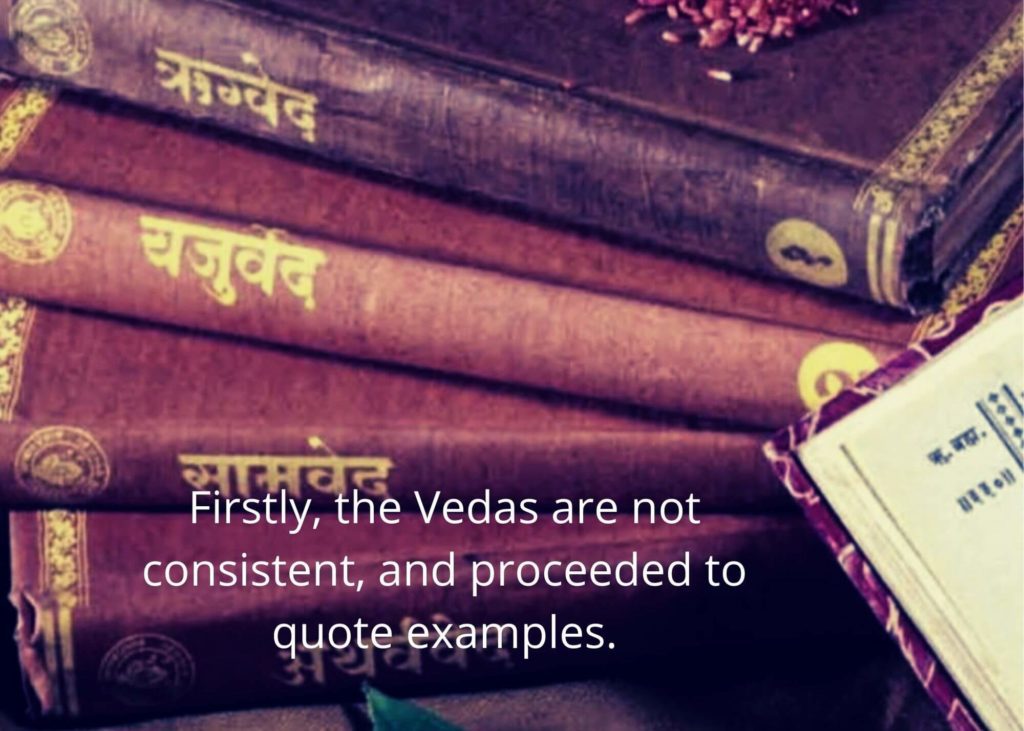Reading Time: 4 minutes
Manuvadi, among other tags, hurt Soumya. Here he talks about the ancient Hindu treatise, one of the six surviving Smritis, which is often misunderstood. An exclusive for Different Truths.


I have often been called names that irritated, amused, or sometimes hurt me, but mostly I preferred to ignore unless I could think of a quick retort or could intimidate the abuser.
But when I get called names by my darling off-springs, presumably in the spirit of constructive criticism, I tend to introspect.
I have been called patriarchal, parochial, elitist, homophobic, Islamophobic, misogynistic, racist, intolerant, casteist, bigoted and Manuvadi. Of course, often these adjectives come with the consolation that it is not my fault, it is part of my genetic makeup and fault of my upbringing.
Now given that I am male upper caste Indian Hindu from an educated upper middle-class family and had the advantage of an elitist anglicised education and working in an executive position, these accusations could apply to someone of my background, though of course I personally feel that these do not apply to me in person.
But I was intrigued by the Manuvadi epithet, which is as much an abuse today among the liberal intelligentsia…
But I was intrigued by the Manuvadi epithet, which is as much an abuse today among the liberal intelligentsia as “burjua” and “pati burjua” were for the leftists of my generation without understanding what they meant. The intended words were bourgeois and petit bourgeois which meant something quite different.
I suspected that Manuvadi also falls in the same category. So, I decided to read up on the much-maligned gentleman’s nefarious treatise.
The first thing I discovered was that Manusmriti was only one of six surviving smritis, or treatises of ancient India and not a manual or code in the lines of hammurabi’s code or the ten commandments or the shariya. There were probably many more smritis that bombed in the box office and did not survive till date. No doubt out of these Manusmriti was the bestseller among the general readers.
The next thing I discovered was that it did not claim that the suggestions were divine laws or the words of God and not following would mean eternal domination…
The next thing I discovered was that it did not claim that the suggestions were divine laws or the words of God and not following would mean eternal domination or severe punishment in this world. They were just that, his suggestions. And he gave the basis of his suggestions too, not claiming any divine wisdom or God given authority to lay down laws.
Some of the suggestions looked quite reasonable too, for example, obedience to, reverence towards and politeness to elders, parents, and seniors. An elderly parent, this appealed to me. My children may think otherwise.
The basis for his code also was not unreasonable.
The basis for his code also was not unreasonable. He mentioned four guidelines:
· First, as prescribed in the Vedas.
· Second as practiced by the community.
· Third, the example of respectable leaders of society
· And finally, the most interesting, your conscience.
Now nothing could be fairer, I thought.
On top of this he sought suggestions from his peers as to what else could be done.
What could be more liberal? Even today’s political parties are not this accommodating.
And how did his peers react? Was he hailed as the ultimate law giver as is nowadays presumed?
Far from it. Criticism and critics have not changed in a millennium.
They found a very logical ground to dispute his basis.


They found a very logical ground to dispute his basis. And the logic of the critics is extremely modern and would have been considered blasphemy in any other culture or society except our incredibly tolerant and scientific one.
They said that:
· Firstly, the Vedas are not consistent, and proceeded to quote examples.
· Two, practices of communities differ and change over time, and it would not be fair to choose one community in one age over another, even that of the current most powerful or ruling community.
· Three, leaders of society are not infallible and also are inconsistent in their own behavior. Therefore, they are not the perfect role model. Some even question who should be considered a leader of the community.
· That finally leaves our conscience, and this is the best basis of a moral or ethical code.
Can one imagine a more rational scientific modern secular approach to a social, religious, or moral code?
Can one imagine a more rational scientific modern secular approach to a social, religious, or moral code?
However, this was too abstract for the lawmakers and the citizens I suppose. And the code suggestions became de facto laws by the Middle Ages.
But I do not think being a Manuvadi is automatically a term of abuse, just as being a bourgeois or petit bourgeois wasn’t. It is merely half-understood words being used for illogical arguments.
Visuals by Different Truths















